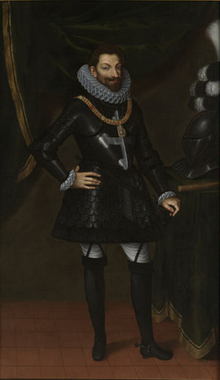Charles Emmanuel I
| Charles Emmanuel I | |
|---|---|
 |
|
| Duke of Savoy | |
| Reign | 30 August 1580 – 26 July 1630 |
| Predecessor | Emmanuel Philibert |
| Successor | Victor Amadeus I |
| Born |
12 January 1562 Castle of Rivoli, Rivoli, Piedmont, Italy |
| Died | 26 July 1630 (aged 68) Savigliano, Piedmont |
| Spouse | Catherina Micaela of Spain |
| Issue Detail |
|
| House | Savoy |
| Father | Emmanuel Philibert, Duke of Savoy |
| Mother | Margaret of France |
Charles Emmanuel I (Italian: Carlo Emanuele di Savoia; 12 January 1562 – 26 July 1630), known as the Great, was the Duke of Savoy from 1580 to 1630. He was nicknamed Testa d'feu ("the Hot-Headed") for his rashness and military aggression.
He was born in the Castle of Rivoli in Piedmont, the only child of Emmanuel Philibert, Duke of Savoy and Margaret of France, Duchess of Berry. He became duke on 30 August 1580.
Well-educated, and intelligent, he spoke Italian, French and Spanish, as well as Latin. He proved an able warrior although short and hunchbacked. Being also ambitious and confident, he pursued a policy of expansion for his duchy, seeking to expand it into a kingdom. In the autumn of 1588, taking advantage of the civil war weakening France during the reign of his first cousin Henry III, he occupied the Marquisate of Saluzzo, which was under French protection. The new king, Henry IV, demanded the restitution of that land, but Charles Emmanuel refused, and war ensued. The broader conflict involving France and Spain ended with the Peace of Vervins (2 May 1598), which left the current but separate question of Saluzzo unsolved. After the Duke started talks with Spain, Henry threatened to return to war until, with the Treaty of Lyon (17 January 1601), Saluzzo went to Savoy in exchange for Bresse and other territories over the Alps. By terms of the treaty, the eradication of Protestants was to be carried on in the duchy.
In 1602 Charles Emmanuel attacked the city of Geneva. On 11 December that year he led his troops to the city during the night and they surrounded the city walls by two in the morning. The Savoyard cuirassiers were ordered to dismount and climb the city walls in full armour as a shock tactic. However, the alarm was raised by a night watchman and Geneva's militia rose to meet the invaders. The attempted raid was a disastrous failure, and 54 Savoyards were killed, and many more were captured. Charles Emmanuel's army retreated in a panic and the Savoyard prisoners were executed.
...
Wikipedia
